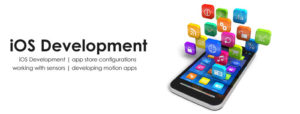Important Things About iOS Developer!!

iOS (originally iPhone OS) is a mobile operating system created and developed by Apple Inc. and distributed exclusively for Apple hardware. It is the operating system that presently powers many of the company’s mobile devices, including the iPhone, iPad, and iPod touch. Apple iOS has seen series of generations from iOS 1.0 to the latest iOS 7 released in the month of September, 2013. Apple mobile Operating System is dated back to June, 2007 when it was first released with the launch of the iPhone.
Apple mobile Operating System is an off shoot of Apple OS X used on Apple Computers. The term iOS was first used in the month of June, 2010, before then the Operating system was simply known as iPhone OS. Perhaps this became necessary as more of Apple devices operate on the iOS platform. It will sound odd to describe the Operating System across board as iPhone OS.
Some important skills for ios developer –
1. Swift
Swift is the programming language Apple created specifically for developing their apps. This is the language of all future development for iOS. So you have to know it! Our own experts acknowledge it’s not a “small” language, but you don’t have to know everything to land a junior position. What you WILL need to do is make sure you’re comfortable with:
o Basic syntax
o Optional
o Control Flow (If and Switch Statements)
o Classes, inheritance & initialization
o Error handling
o Objective-C Interoperability
For those with programming experience who want to become familiar with Swift, check out Udacity’s Swift Syntax course.
2. Spatial Reasoning
The ability to think in 3-D, and visualize the spatial relations between objects, is critical for successful App Developers. Simply put, when you design interfaces for devices like the iPhone, Apple Watch, or the new Apple TV, you must be cognizant of how users will interact with your application. So you need to:
1. Understand the types of controls/inputs available (and popular) for the different platforms, and
2. Be a user of the devices you’re targeting so that you can reason about them!
While some people may more naturally evidence this ability, rest assured it is a learned skill, and can be mastered with practice, and through building real projects.
3. Design Guidelines
Successful iOS apps are known and admired for being supremely intuitive. The reason for this is that these apps adhere to a strict set of design guidelines. How data is stored and displayed to the user is handled in very specific ways. In order to build your own intuitive apps, you need to know and understand these design patterns. That’s why, if you pursue becoming an iOS developer through our Nanodegree programs, you’ll learn critical things like:
o MVC (Model-View-Controller): This is the cornerstone of any iOS or OSX App, and it defines how data is stored, how it is presented to the user, and how it is updated in response to user interactions.
o Delegate Pattern: This is a very common way of passing information among objects in Cocoa (one sender, one receiver)
o Notifications: another common way of passing information (one sender, multiple receivers)
4. Networking
To understand the importance of networking to app development, first try to think of an app on your phone that doesn’t interact with the web. Could you think of one? Chances are either you couldn’t, or it took you a bit to think of one, because almost every app we interact with talks to the web in some way. For that reason, it’s crucial for you to understand how to send and receive data from the network.
How this is done is through something commonly referred to as JSON, which stands for JavaScript Object Notation. That might sound complicated if you’re not familiar, but it’s a really a standard format that’s actually fairly straightforward. At Udacity, we’ve got a full course devoted to networking: iOS networking with Swift.
5. Core Data
Here’s what one of our Subject Matter Experts recently had to say about Core Data: “Learning Core Data is like exercising: the first few days feel like torture, but by the second week, you can’t believe you lived without it!”
Core Data is essentially THE persistence framework for Apple devices. Imagine if every time you used an app, your data was lost. This would be similar to the early days of video games, where you had to beat Super Mario Brothers in one run since you couldn’t save progress. Core Data is the most important framework for storing data on Apple devices. We’ve got a great course on it here: iOS Persistence and Core Data.
6. Grand Central Dispatch
Colloquially known as GCD, Grand Central Dispatch is what allows you to add what’s called “concurrency” to your apps, thereby making it possible for multiple tasks to run simultaneously with ease. Why is this important? Our apps do a lot at once: pulling data from a network, displaying information on screen, reading touch inputs from the user…running all of these things at one time would put incredible strain on the user’s phone: it would either run really slowly or crash. So you need to learn about concurrent programming, so you don’t cause crashes! Check out our Grand Central Dispatch course.
7. Git and GitHub
Effective use of version control is an important and useful skill for any developer working on long-lived (or even medium-lived) projects, and is essential to working with teams. We consider this so important that we actually partnered directly with GitHub to teach it!
